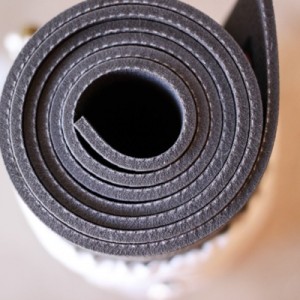My InsideTracker Results (+ a giveaway!)
This post isn’t sponsored but I loved my experience with InsideTracker so much I wanted to share it here on the blog. They’re offering a discount for readers, too. Enter the code FITNESSISTA to get 22% off your Ultimate Test and also check out the giveaway at the bottom of this post!
Me, wondering if all of the salads I eat are actually doing anything:
When you work out consistently and eat well for the most part, the impact of your efforts can be a mystery. I haven’t had a thorough blood test in over a year – the last time was when I was having gallbladder things but thankfully everything came back ok – so when InsideTracker reached out to see if I wanted to take an Ultimate Test (and Inner Age, which calculates your inner age based on a variety of biomarkers), I jumped at the opportunity. InsideTracker is a personalized nutrition and wellness platform that analyzes data from your blood, DNA, and lifestyle to help you optimize your body and reach your wellness and fitness goals.
I HATE having blood taken, but was really interested to see the results from this test, which provides results for over 40 different biomarkers. It was very easy to get my blood taken, even during Rona times. I made an appointment at the lab, which wasn’t busy at all, and it was fast and pain-free. If you don’t want to go to a lab, you can choose the mobile blood draw option and the phlebotomist will come to your house.
Before I had my blood taken, I filled out a thorough survey under my profile with my eating habits, sleep, and workout routine. There was also an area to input goals. Mine were focused on strength improvement, overall health and longevity.
When I got the results back, I couldn’t wait to dive in… and was also a bit surprised.
The good news:
37 of my biomarkers were in the optimal ranges! A few of the commonly low markers were in optimal ranges, like Vitamin D, magnesium, and my cortisol was surprisingly in a healthy range. I also had good platelets, calcium, folate, sodium, liver enzymes, and inflammation group was in a green range.
My Inner Age was a year younger than my actual age. To be honest, I was kind of bummed to see this. I was hoping it would say my Inner Age was in my 20s! This brings me to the meh news of my results.
The meh news:
– High white blood cell count. This is an immune system indicator. I talked to my doctor and she said a lot of things can affect this, like where you are in your menstrual cycle, chronic allergies, and stress. She said that we’ll keep an eye on it. (I went back to my old blood test results when we lived in San Diego to compare and it was the same high number back then, too. It’s funny because last summer when I had my blood taken, it was in the green range. Apparently these are all over the place for me, but I really want to work and get this number down.) This was a huge reason why my Inner Age wasn’t as low as I would like it to be.
– Low iron. This was due to low ferritin, which is a marker of iron storage and iron metabolism. The RD I spoke with from InsideTracker recommended starting an iron supplement, so I’m starting that this week to see if the levels improve.
– High glucose. This was a surprise for me and is my biggest focus going forward. High fasting glucose levels can cause weight gain, elevated blood pressure, increased cholesterol and triglycerides, and poor heart health. Yikers.
– Low DHEAs. This is a hormone precursor that is synthesized in the adrenal glands from cholesterol. The body uses DHEAS to make different steroid sex hormones, including estradiol and testosterone, as well as other sex steroid precursor molecules. DHEAS levels increase from childhood until age 20-30, then decline steadily with age. Healthy DHEAS levels in women are associated with a healthy immune system, increased energy, better bone and muscle health and good sexual function. Having lower levels of DHEAS throughout life is associated with decreased immunity, poor cardiovascular health, and unstable blood sugar levels. If your DHEAS levels are low, you may feel weakness and fatigue, have trouble controlling weight, suffer irregularities in your menstrual cycle, and struggle to become pregnant.
Stress levels can contribute to low DHEAs and unstable blood sugar, so this could go hand in hand with my glucose issues.
– Below optimized HDL. This is the good cholesterol that acts as cholesterol scavengers, picking up excess cholesterol in the bloodstream and taking it back to the liver where it’s broken down and eliminated. If your levels of HDL are below optimal, you may be at greater risk of poor heart health.
After your test, you have the opportunity to have a consult with a Registered Dietitian on their team, who can give personalized recommendations based on your results. I found this portion of the testing process to be invaluable, because it can be overwhelming to sort through the results and recommendations on your own. They can answer questions and give you foods to focus on as you work to improve your biomarkers.
Some of my recommendations:
– Increase my healthy fat intake (chia seeds, flax, avocado, nuts) along with leafy greens, beans, whole grains, and fish. These seemed to be the recommendations across the board for my markers that were in the suboptimal ranges. I’m focused on eating more protein, healthy fat, and fiber, along with taking an iron supplement and working to mitigate stress/inflammation.
– Continue to practice yoga, as it can help with stress and sleep.
– Continue to alternate my workout intensities so I’m not adding too much additional stress to my body.
I LOVED taking this test, and while I wasn’t super stoked about all of my results, it gave me a purposeful direction on things I’m going to work towards. I’m excited to take it again in 6 months and see how things have improved with some diet and lifestyle changes.
If you’d like to check it out, use the code FITNESSISTA for 22% off the Ultimate Test here.
InsideTracker has been amazing (you guys are going to love it so much) AND they kindly offered to give away a test to a lucky reader friend!
Tell me, friends: what’s one of your biggest health or wellness goals right now? Anyone have experience getting white blood cell and/or glucose levels to go down?
xo
Gina















Wow! This is so interesting and I would love to take a test like this to see if I get any surprises as well. I don’t have any tips for you-sorry. 🙁
I had gestational diabetes with my oldest and I was so upset because I was not overweight, exercised, and ate well. While constantly checking my glucose levels, I noticed that certain foods spiked my sugar more than others. Like 1 slice of pizza would send it through the roof but chips and salsa would not. So maybe track your levels and see if you can find something that is setting it off more than you think?
Also, cinnamon has been proven to help regulate glucose levels so I still put it on everything!
that’s a great tip! i could totally see how certain things would affect it more. i’m going to start using cinnamon more often, too!
Really interesting concept. White blood cell count can vary based on tons of different things as you already know, and I think it would be hard to target lowering those unless they are sky high and you think it’s due to an illness that needs treated. Same with glucose… I’d question what they are calling “high”. If it was 140 and you just ate a meal- yes it’s high but it’s normal for that moment. A1c provides a three month glucose average and it’s a little more useful- a marker that varies all day long is more useful when looked at as an average.
ok that’s interesting to hear! my a1c was in a better range (5 – still at the high part) and the test was fasted. glucose was an 11. my WBC was 11.6 and when i got it tested with the gallbladder stuff it was a 6! it’s all over the place apparently. i’m going to retest and not have alcohol or a late/heavy meal the night before and see if it helps
I find this stuff so interesting–I’m such a data nerd. I’m actually planning to do a genetic test next month to help me unpack some stuff regarding family cancer history. It’s funny, I’m a registered dietitian and health coach and my patients will sometimes make comments, like, “You don’t have to worry about this stuff,” when the truth is that that “stuff” had a lot to do with why I went into this field! I also have familial high cholesterol, and it feels like the second I start eating red meat regularly it shows up on my labs, so I have to pay attention to what I eat to keep it in a healthy range. Haha we have been doing a lot more plant-based meals and fish for dinner in my home the past few months. Stress messes with so many things too…I’ve seen it in myself and with my patients. Such an important part of the picture and glad your doctor talked about that.
My biggest health goal right now is increasing my veggie intake and eating out less. I’ve never been a big fan of veggies, but I’m shooting for 6 servings a day (2 servings at each meal). I’m consistently hitting 4 servings, so I’m considering that great progress!
I really geek out about things like this and have always wanted to do a test like this but get a little nervous about why they want my DNA